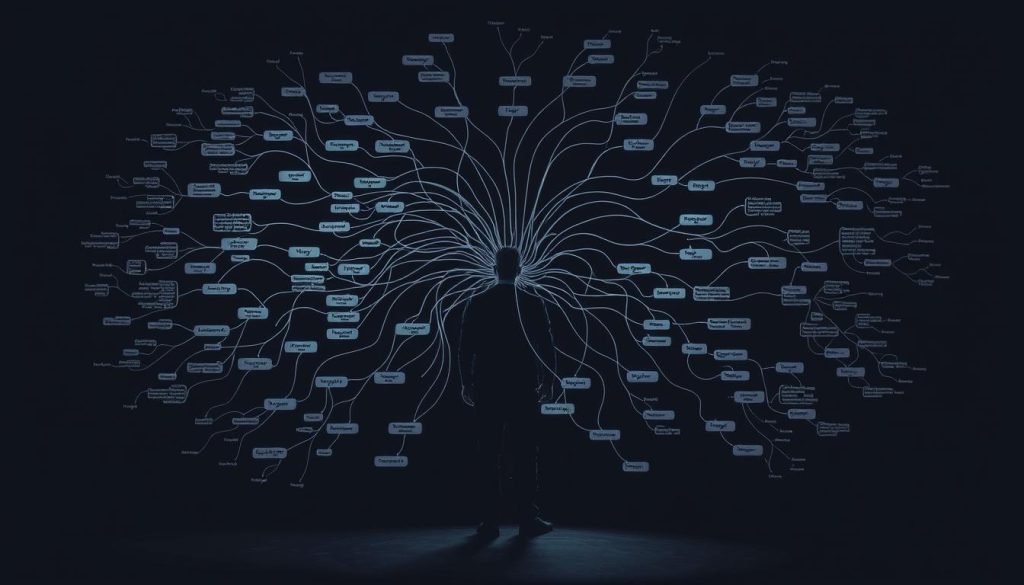We’ve all been there – putting off important tasks until the last minute. Procrastination is a common human behavior that affects people from all walks of life. Whether you’re a student, professional, or retiree, chances are you’ve experienced the struggle of delaying tasks.
So, why do we procrastinate? Research suggests it’s not just about being lazy. It’s often due to complex psychological factors. By understanding procrastination, we can begin to overcome it and develop more effective habits.
Key Takeaways
- Procrastination is a widespread issue affecting various aspects of life.
- It’s not just about being lazy; complex psychological factors are at play.
- Understanding the root causes of procrastination is key to overcoming it.
- Developing effective habits can help you stay on track and achieve your goals.
- Recognizing your procrastination patterns is the first step towards change.
The Psychology of Procrastination: A Scientific Overview
Procrastination is more than just being lazy. It’s a complex issue that involves many factors. These include cognitive, emotional, and behavioral aspects.
Defining Procrastination Beyond Simple Laziness
Procrastination means delaying tasks even when we know it’s bad. It’s about choosing short-term gains over long-term benefits. This choice often leads to feelings of guilt, stress, and anxiety.
Research shows procrastination isn’t just laziness. It involves fear of failure, perfectionism, and dislike for certain tasks. Knowing these reasons helps us tackle procrastination better.
The Prevalence of Procrastination in American Society
Procrastination is common in America, affecting many people. Studies say up to 20% of adults are chronic procrastinators.
This widespread issue affects productivity, mental health, and overall happiness. It can cause missed deadlines, lost chances, and more stress, harming our quality of life.
Historical Perspectives on Procrastination Research
Research on procrastination has grown a lot over time. Early studies saw it as a trait or behavior. Now, we explore the cognitive and emotional sides of it.
Once, procrastination was seen as a moral flaw or laziness. But today, it’s viewed as a complex psychological issue. It’s influenced by motivation, self-regulation, and managing emotions.
The Neuroscience Behind Why We Procrastinate
Procrastination isn’t just about being lazy. It’s a complex issue rooted in our brain’s workings. Studies reveal that it involves the limbic system and the prefrontal cortex. Knowing this can help us understand why we often delay tasks.
Temporal Discounting: The Brain’s Preference for Immediate Rewards
Temporal discounting explains why we often prefer immediate rewards over future ones. This preference makes us choose easy tasks over harder ones. For example, watching TV might seem better than working on a project.
This preference is linked to dopamine in our brain’s reward system. When we get an immediate reward, our brain lights up. This makes the task more appealing, leading to procrastination on tasks without immediate rewards.
Executive Function and Self-Regulation Failures
Procrastination also stems from failures in executive function and self-regulation. Executive functions, like planning and problem-solving, are managed by the prefrontal cortex. When these are impaired, starting tasks and avoiding distractions become harder.
Self-regulation failures happen when we can’t control our impulses and emotions. For example, getting distracted by social media can lead to procrastination. Improving self-regulation can help overcome these issues.
Dopamine, Motivation, and the Procrastination Cycle
Dopamine is key in motivation and the procrastination cycle. It’s linked to pleasure and reward. But, it can also contribute to procrastination. If a task seems boring or hard, it might not release enough dopamine, making it hard to start or continue.
Understanding dopamine’s role can help us find ways to beat procrastination. Breaking tasks into smaller parts or making them more enjoyable can help.
Emotional Roots of Procrastination Behavior
Procrastination is deeply rooted in emotions, affecting us in many ways. It’s not just about managing time. It’s about managing our feelings. People often delay tasks because they struggle with their emotions, not because they can’t plan their time.
Let’s explore the emotional reasons behind procrastination. We’ll see how fear of failure, dislike of tasks, and anxiety can make us put things off.
Fear of Failure and Perfectionism
Fear of failure is a big reason for procrastination. The fear of not meeting expectations or making mistakes makes us hesitate. Perfectionism makes it worse, as we worry our work won’t be good enough.
For example, a student might delay their thesis because they fear it won’t be perfect. This fear can stop them in their tracks, causing big delays.
Task Aversion and Negative Emotions
Task aversion is another reason for procrastination. If a task seems boring, hard, or too much, we tend to avoid it. The negative feelings it brings, like anxiety or frustration, make us want to stay away even more.
Anxiety and Uncertainty Avoidance
Anxiety and the fear of the unknown also contribute to procrastination. When a task is uncertain or stressful, we might delay it. This temporary relief can actually increase stress later on.
To understand procrastination better, let’s look at a table:
| Emotional Factor | Description | Example |
|---|---|---|
| Fear of Failure | Avoiding tasks due to fear of not meeting expectations | Delaying a project due to fear of not doing it perfectly |
| Task Aversion | Avoiding tasks perceived as boring or difficult | Putting off a difficult assignment because it seems overwhelming |
| Anxiety and Uncertainty | Delaying tasks due to associated anxiety or uncertainty | Postponing a task because it involves unknown variables |
Knowing these emotional roots helps us find ways to beat procrastination. By tackling these emotional issues, we can manage our procrastination better.
Common Procrastination Patterns and Types
We all procrastinate, but did you know there are different types? Knowing these patterns helps you spot your habits and find ways to beat them.
Procrastination isn’t the same for everyone. It changes based on who you are and the situation. By figuring out your type, you can find the best way to fight it.
Avoidance Procrastination: Dodging Difficult Tasks
Avoidance procrastination is when we avoid tasks we find hard or unpleasant. It’s often because we’re scared of failing or want everything to be perfect.
Arousal Procrastination: The Thrill of the Deadline
Some people love the rush of meeting deadlines. They delay tasks to feel that excitement. This is called arousal procrastination.
Decision Paralysis: When Too Many Choices Lead to Inaction
Decision paralysis strikes when we’re faced with too many choices. It makes us unsure and do nothing. This happens when there are lots of options.
Academic vs. Workplace Procrastination Patterns
Procrastination looks different in school and at work. Knowing these differences helps us find the right strategies for each place.
Let’s look at the main differences between academic and workplace procrastination:
| Characteristics | Academic Procrastination | Workplace Procrastination |
|---|---|---|
| Task Nature | Assignments, exams, research papers | Projects, reports, meetings |
| Consequences | Grades, academic standing | Career advancement, job security |
| Common Triggers | Fear of failure, lack of interest | Workload, office distractions |

By knowing these different patterns, we can create plans to beat our procrastination. It’s all about finding the right strategy for you.
Psychological Theories Explaining Why We Delay
Procrastination is a complex behavior influenced by various psychological factors. Exploring these theories can provide valuable insights into why we delay tasks.
Several psychological theories have been proposed to explain procrastination. Let’s examine three key theories: Self-Determination Theory, Temporal Motivation Theory, and Cognitive Behavioral Models.
Self-Determination Theory and Motivation
Self-Determination Theory (SDT) says human behavior is motivated by three innate needs: autonomy, competence, and relatedness. According to SDT, procrastination occurs when these needs are not met. For instance, if a task is controlling, it can lead to less motivation and more procrastination.
“People are more likely to procrastinate when they feel a lack of autonomy, competence, or relatedness in the tasks they are required to perform.” This theory suggests that fostering an environment that supports these needs can help reduce procrastination.
| Psychological Need | Impact on Procrastination | Example |
|---|---|---|
| Autonomy | Less procrastination when tasks allow for personal choice. | Choosing your own project topic. |
| Competence | Less procrastination when tasks are challenging yet manageable. | Receiving training before a new task. |
| Relatedness | Less procrastination when tasks involve or are supported by others. | Working in a team rather than alone. |
Temporal Motivation Theory: The Procrastination Equation
Temporal Motivation Theory (TMT) offers a quantitative approach to understanding procrastination. It suggests that motivation is a function of the task’s expectancy, value, and the delay associated with it. The formula is: Motivation = (Expectancy × Value) / Delay.
This theory indicates that procrastination can be reduced by either increasing the expectancy and value of the task or by reducing the delay. For example, breaking down a large task into smaller, manageable parts can make it less daunting and reduce procrastination.
“Motivation is highest when expectancy and value are high, and delay is low.”
Cognitive Behavioral Models of Procrastination
Cognitive Behavioral Models focus on the thought patterns and behaviors that contribute to procrastination. These models suggest that procrastination is often the result of distorted or unhelpful thinking patterns, such as perfectionism or fear of failure.
Cognitive Behavioral Therapy (CBT) is an effective approach to addressing these thought patterns. By identifying and challenging negative thoughts and replacing them with more balanced ones, individuals can reduce their tendency to procrastinate.
- Identify negative thought patterns.
- Challenge and reframe these thoughts.
- Develop more constructive behaviors.
The Mental Health Effects of Chronic Procrastination
Chronic procrastination can harm our mental health in many ways. It affects not just how productive we are but also our overall well-being. Putting off tasks can lead to feelings of guilt, stress, and anxiety. These feelings can spread into many parts of our lives.
We’ll look at how chronic procrastination affects our mental health. We’ll see why it’s important to tackle this behavior.
Anxiety, Stress, and Depression Connections
Chronic procrastination is closely tied to anxiety and stress. Delaying tasks can make us feel more pressure to finish them fast. This can increase our stress levels even more.
This stress can make our anxiety worse, creating a cycle. Also, procrastination can lead to depression. The guilt and shame of not meeting our expectations can harm our mental health over time.
Impact on Self-Esteem and Self-Efficacy
Procrastination can hurt our self-esteem and self-efficacy. Putting off tasks can make us feel like we’re not capable. This can lower our self-esteem.
Also, avoiding tasks can make us doubt our ability to do them. This can make us believe less in ourselves. This creates a cycle where the more we procrastinate, the less we believe in ourselves.
Physical Health Consequences of Procrastination-Related Stress
The stress from chronic procrastination can harm our physical health. It can lead to high blood pressure, heart disease, and a weak immune system.
Also, the anxiety and depression from procrastination can cause changes in appetite and sleep problems. These can lead to other physical health issues.
| Mental Health Impact | Description | Potential Consequences |
|---|---|---|
| Anxiety and Stress | Increased pressure to complete delayed tasks | Heightened stress levels, anxiety disorders |
| Depression | Guilt and shame over procrastination | Depressive episodes, loss of motivation |
| Self-Esteem and Self-Efficacy | Feelings of incompetence, reduced belief in one’s abilities | Lowered self-esteem, decreased self-efficacy |

Evidence-Based Strategies for Overcoming Procrastination
Procrastination can be beaten with strategies that fit your needs. It takes a mix of approaches to tackle the root causes and build a productive mindset.
Cognitive Restructuring: Changing How You Think About Tasks
Cognitive restructuring changes negative thoughts that lead to procrastination. It helps by spotting and questioning unhelpful thoughts. For example, instead of thinking “I’ll never finish this,” you can say “I’ll break it down into smaller parts and do them one at a time.”
Key steps in cognitive restructuring include:
- Identifying negative self-talk
- Challenging the validity of these thoughts
- Replacing them with more balanced and positive alternatives
Implementation Intentions and the Power of “If-Then” Planning
Implementation intentions are about planning when and where to do a task. For instance, “If it’s Monday morning, then I will start my project.” This makes it easier to go from planning to action.
To apply implementation intentions effectively:
- Identify the task you want to accomplish
- Specify the time and place for starting the task
- Create an if-then plan to link the task to a specific situation or cue
Time Management Techniques: Pomodoro, Time Blocking, and More
Good time management is key to beating procrastination. The Pomodoro Technique, with focused 25-minute work and 5-minute breaks, boosts productivity. Time blocking, scheduling tasks in fixed blocks, is also effective.
Environmental Modifications to Reduce Procrastination Triggers
Changing your environment can help fight procrastination. This might mean cleaning up your workspace, turning off distractions, or setting up a better work area. A better environment makes it easier to stay focused.
Simple environmental modifications include:
- Creating a dedicated workspace
- Using tools or apps to block distracting websites
- Organizing digital and physical files for easy access
When Procrastination Becomes Pathological: Clinical Approaches
Procrastination can be a sign of a deeper issue if it’s persistent and interferes with daily life. While many people put off tasks, for some, it’s a big problem. Knowing when to seek help is important.
Distinguishing Everyday Procrastination from Psychological Disorders
Not all procrastination is the same. Everyday procrastination is usually situational and doesn’t affect life much. But, if it’s chronic and linked with anxiety, depression, or ADHD, it might be a sign of something more serious. Clinical evaluation is key to figuring out the cause and treatment.
A table can help show the difference between everyday and pathological procrastination:
| Characteristics | Everyday Procrastination | Pathological Procrastination |
|---|---|---|
| Frequency and Impact | Occasional, minimal impact on life | Frequent, significant life impairment |
| Associated Symptoms | Few or no other symptoms | Often accompanied by anxiety, depression, or other mental health issues |
| Response to Strategies | Responsive to simple time management or motivation techniques | Resistant to conventional strategies, requiring clinical intervention |
Therapeutic Interventions: CBT, ACT, and Mindfulness Approaches
For those with pathological procrastination, several therapies can help. Cognitive Behavioral Therapy (CBT) helps change negative thoughts that lead to procrastination. Acceptance and Commitment Therapy (ACT) teaches accepting emotions while taking actions that match personal values. Mindfulness also helps by making us more aware and reducing stress.
“Mindfulness is the aware, balanced acceptance of the present moment. It’s not about avoiding or suppressing difficult emotions; it’s about learning to be with them in a way that doesn’t control our behavior.” –
Understanding the clinical side of procrastination and trying different therapies can help. This way, people can overcome procrastination and improve their mental health.
Conclusion: Moving Beyond Procrastination
We’ve looked into the psychology of procrastination, from its emotional causes to the brain’s role. Knowing why you procrastinate is key to beating it. By spotting your patterns, you can find ways to work better.
Beating procrastination takes time, self-knowledge, and the right methods. Using proven techniques like changing your thoughts and setting clear plans can help. It’s about moving forward, not being perfect.
Remember, small steps can make a big difference in your productivity and happiness. By understanding and tackling procrastination, you can reach your goals. Start overcoming procrastination today and see how it improves your life.

